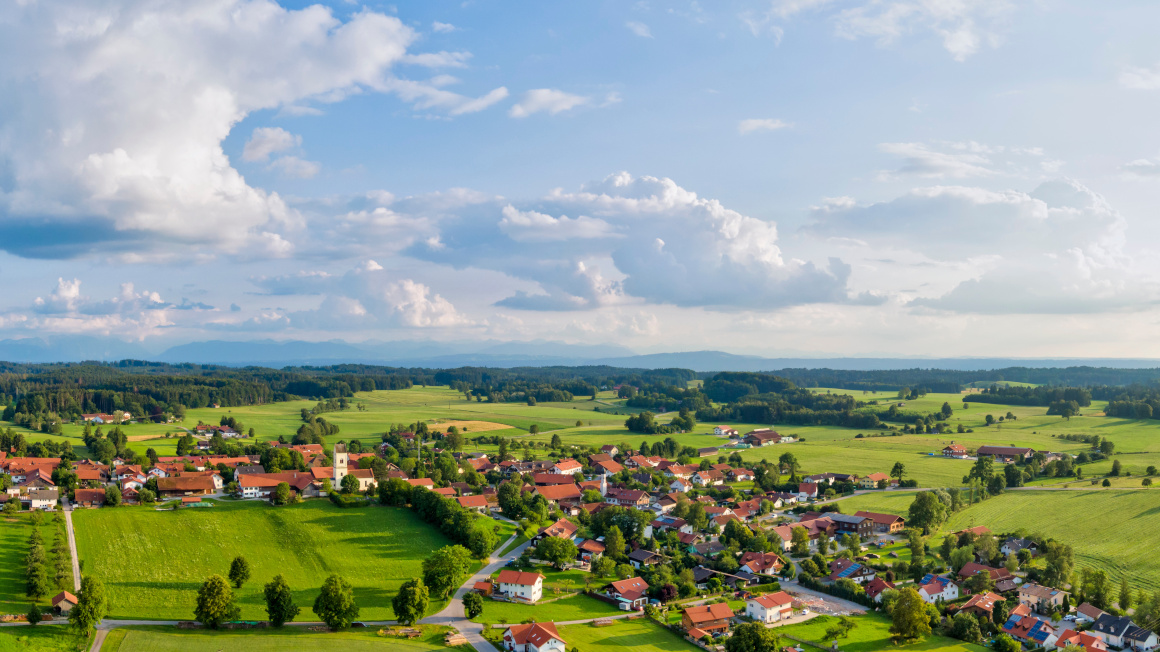Sustainable transformation of agriculture
Agricultural ecosystems are more than just land used for farming. They encompass all the biological, physical and social processes that take place in agricultural landscapes. These include soil functions, water and nutrient cycles, biodiversity, and the social and economic structures that shape agriculture and are shaped by it. These systems interact closely with their environment and are also dependent on it. They are dynamic, diverse and strongly influenced by human activity.
Against this backdrop, it is clear that a sustainable transformation of agriculture cannot be achieved through isolated individual measures alone. An overarching, systemic approach is required that integrates ecological, economic and social aspects. Agriculture must be understood as part of a larger, complex network in which various actors, processes and framework conditions are intertwined.
The challenge lies in the high complexity of these systems. Their research, design and further development require an interdisciplinary approach. Natural sciences, social sciences, agricultural sciences and other disciplines must contribute their specific perspectives, methods and findings and link them together. Only through this close cooperation can the necessary knowledge be generated to make agricultural systems future-proof, resilient and sustainable. The agroecology approach offers a promising framework for this, as it aims to combine scientifically sound sustainability with practical feasibility.
Page 2 of 4
Agroecology as a knowledge-based, systemic approach to sustainable agriculture
Agricultural ecosystems fulfil far more functions than simply producing food. They are deeply embedded in social, ecological and economic contexts and influence key areas of human and natural habitats. The demands placed on them are correspondingly diverse, as are the opportunities and conflicting goals associated with their transformation.

At the socio-economic level, agroecosystems contribute significantly to regional value creation. They create jobs, secure incomes in rural areas and shape the social and cultural structure of entire regions. In many countries in the Global South, small-scale farming is not only an economic foundation but also an existential one, in the form of subsistence farming, food security and local resilience.
At the same time, agroecosystems provide a wide range of ecosystem services. They influence water quality and water balance, contribute to carbon storage, provide habitats for a variety of species and enable local recreation. Their contribution to climate and species protection is also central, and agriculture plays a dual role here: it is a co-contributor to environmental change, for example through emissions or land use, but at the same time it is directly affected by its consequences, such as extreme weather, soil degradation or the loss of pollinators.
However, these diverse functions are not free from conflicting goals, which further increases complexity. There are often tensions between ecological goals, climate measures, economic profitability and social expectations. Increasing production output, for example, can ensure economic competitiveness and save land, thereby protecting ecosystems. At the same time, it can have negative effects on the biodiversity of the cultivated area or on water quality. Similarly, climate protection measures can place short-term economic burdens on agricultural businesses and, depending on their design, can also harm biodiversity. Such conflicts of interest require careful consideration and an integrative approach at the system level, as agroecology strives to achieve.

In this context, agroecology is understood as a scientifically based, systemic approach that takes into account the complex interplay of natural processes, agricultural practices and societal requirements. It aims to promote resilience, sustainability and equity simultaneously – by combining local knowledge and scientific analysis, through participatory processes and by considering ecological, economic and social factors together.
Agroecology – definition and differentiation
The term agroecology is used differently in scientific, political and practical contexts: in the narrower sense as an agricultural science discipline, as an expanded framework for integrating ecological principles into agricultural systems, for example in the discourse on development policy, or in the broader sense as a socio-political movement for a profound, primarily social transformation of nutrition systems. The English term agroecology is also used in German-speaking countries to emphasise an approach based particularly on scientific rigour and innovation. The following study provides a current analysis of the different definitions and understandings:
Page 3 of 4
Scientific diversity as a basis: interdisciplinarity in agroecology
Agroecology is therefore much more than just a new technical approach or an alternative form of agriculture. It is a comprehensive concept that views agricultural practice as part of a complex social, ecological and economic fabric. In order to grasp this complexity, close cooperation between a wide range of scientific disciplines is necessary, because the systemic and multifactorial nature of agroecosystems makes interdisciplinarity a basic prerequisite for successful agroecological research and practice.

Agricultural sciences provide a fundamental understanding of the biological and technical processes involved in agriculture. They deal with topics such as plant nutrition, soil science, animal husbandry and cultivation systems. In agroecology, they play a central role in the development of adaptable, resource-efficient and biodiversity-friendly management strategies.
Environmental sciences analyse the interactions between agriculture and natural systems. Among other things, they examine material cycles, water and air quality, climate impacts and the state of ecosystems. Their contribution is to highlight the environmental impacts of agricultural practices and develop environmentally friendly options, for example to improve carbon storage in the soil or promote beneficial insect populations.
The life sciences, in particular biotechnology, plant and livestock research, breeding research and platform technologies, contribute the high-tech components and expertise. They provide the technological basis for accelerating the transition to agroecology with modern state-of-the-art processes, products and services.
The social and political sciences contribute the necessary knowledge about social structures, power relations, markets and networks of actors, and address issues of justice, participation and governance. They analyse how agricultural practices are embedded in social contexts, which incentive systems are effective, and how transformation processes are influenced by political, institutional or cultural conditions.
Economic sciences, especially in the form of agricultural and environmental economics, make an important contribution to the analysis and design of economic framework conditions for agroecological systems. They examine how market mechanisms, price structures, subsidies and trade policy influence agricultural decisions and to what extent economic incentive systems promote or hinder sustainable action. In addition, they model the cost-benefit ratios of agroecological measures, analyse value chains and develop strategies for internalising external effects, for example in the areas of biodiversity or climate protection.
The humanities, including ethics, history and cultural anthropology in particular, broaden the perspective to include normative and cultural dimensions. They examine, for example, the values underlying agricultural activity, the relationship between humans and nature, and historical developments in agricultural policy.
The combination of these disciplines creates a broad knowledge base that allows for a systemic understanding and further development of agricultural ecosystems.
Page 4 of 4
Research for change: The AGROECOLOGY partnership
The AGROECOLOGY partnership is a European research and innovation project initiated jointly by the European Commission and several Member States within the framework of Horizon Europe.
The cooperation is jointly supported by the EU Commission, the participating countries – represented by their respective research ministries – and partners from the research community, bringing together 72 institutions from 26 countries. The total budget amounts to €300 million (€150 million from the EU Commission) over a total duration of ten years (2024–2033).

The aim is to accelerate the transition to sustainable agricultural systems based on agroecological principles in Europe. To this end, living labs and research infrastructures are being promoted in which science, practice and society work together to develop solutions, as well as research and innovation projects in the context of agroecology.
Germany is involved in the project with several research organisations and is represented at Member State level by the Federal Ministry of Research, Technology and Space (BMFTR) and the Federal Ministry of Agriculture, Food and Rural Affairs (BMLEH). The ministries are particularly committed to linking national research priorities with European goals and promoting the transfer of knowledge into practice. To this end, they are participating in transnational calls for research and innovation projects within the framework of the Agroecology Partnership. The second round of calls is currently underway.
Example projects within the AGROECOLOGY partnership (with German coordination of the transnational joint project)
1. AGRECO4CAST
Led by: Leibniz Centre for Agricultural Landscape Research (ZALF)
The project is developing a prediction model for the impact of agroecological measures at landscape level. It combines ecological modelling with economic data and aims to support policy decisions on a scientific basis.
2. AGROSOIL
Led by: Julius Kühn Institute (JKI)
AGROSOIL investigates how agroecological practices affect soil functions and carbon sequestration. The aim is to develop practical recommendations for soil improvement and climate adaptation.
3. EcoFABULAnds
Led by: Humboldt University of Berlin
The project analyses how functional biodiversity and social actor networks can jointly contribute to the development of resilient agricultural landscapes. It integrates ecological and social science perspectives in regional case studies.
4. GROUND2LIVE
Led by: University of Kassel
GROUND2LIVE focuses on small-scale agriculture in disadvantaged regions and explores ways to restore degraded agricultural soils through community-based measures.
5. HEAL
Led by: University of Bonn
HEAL combines data on landscape structure with agroecological practices to assess their health and environmental impacts. The focus is on developing healthy food systems based on sustainable land use.



